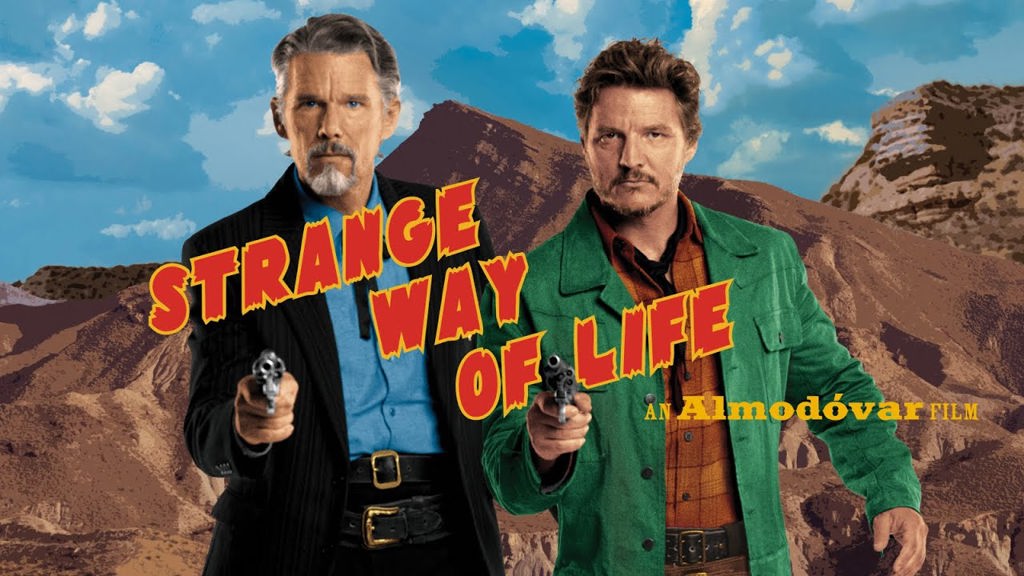3.5/5
Spanish filmmaker Pedro Almodóvar delivers two thought provoking stories with his latest short films.
The first short in this double feature shows the tumultuous spiral of a woman following the end of a relationship. Played by Tilda Swinton, the protagonist is a visually striking character. Throughout the film, she wears various vibrant colours, from deep royal blues to igniting reds. This is not an aesthetic choice without symbolism, rather the vibrancy aids in the outpouring of emotions the protagonist is cycling through during the break-up.
An opening scene in the film shows the protagonist purchasing an axe in a hardware store. The store itself is unsuspecting, but the protagonist’s attire speaks for itself. A monochromatic deep blue outfit accompanied with sunglasses concealing any secrets her eyes may be holding, giving a voice to her emotions.
The majority of the short film is set in the protagonist’s apartment, where she formerly lived with her ex-lover. Much of the dialogue spoken in the film occurs over a phone call with only the protagonist’s voice being heard. Interestingly, this “one-man show” approach to dialogue does not feel confusing to watch. Both the script and Swinton’s performance are meticulous in describing the demise of the relationship with only the protagonist’s voice being heard.
With The Human Voice, Almodóvar seeks to create experimental artistry from the simplicity of one voice. Passion, heartbreak, desperation and anger can all be heard in Swinton’s performance as she paces along the tiles of her abode, a cell of torment.
Swinton could easily rest atop the many accolades achieved and stellar performances she has delivered. Nevertheless, she persists and continues to challenge herself with roles many would not reach the level of. From being a regular in Wes Anderson’s films to playing three roles in Luca Guadagnino’s Suspiria, Swinton is an unrelenting artistic force to be reckoned with.
The Human Voice can hardly be called a digestible watch; it goes down like a screwdriver and the audience always feels left with gaps of information. It is, however, a powerful demonstration of acting and voice as a storyteller, and an engaging one at that.
Strange Way of Life
3/5
The second short film tells the story of two friends, Silva (Pedro Pascal) and Jake (Ethan Hawke), reuniting after years of separation. Set in the unforgiving land of the American southwest, Silva returns to his hometown to visit Jake, who currently holds the title of the local sheriff. The two immediately reignite a spark they shared years ago, revealing buried feelings of romantic affection the two have for each other.
The Western genre has traditionally been a source of masculine iconography with men on cowboys with lassos, dominating the land they cross. Strange Way of Life includes many of those conventions but feels refreshing for depicting homosexuality in a way that does not compromise how masculinity is understood in the Western genre.
Pascal and Hawke give noticeably dramatic performances, though their acting reaches levels of a soap opera at times, making the drama feel a little suffocating, worthy of an occasional eye roll for some. The script itself is also to blame for this and would have benefited significantly from a longer runtime to flesh out the tension between the two.
The primary conflict within the plot surrounds Silva’s son being the prime suspect in a local murder case that Jake is responsible for solving. Both men are faced with the ghosts of their past adventures and must reflect on how the murder impacts their relationship.
While the depiction of masculinity among gay men in traditionally masculine genres is interesting, it has been approached by other works in far more effective and memorable ways. The prime example that comes to mind is Brokeback Mountain, though more recently HBO’s The Last of Us told the tender story of Bill and Frank in the show’s third episode. Although the episode had the groundwork of previous ones to aid in its worldbuilding, it made good work of its script and timeframe to create an air-tight plot.
Strange Way of Life may attract audiences for its lead actors, who both tackle the script with passion, but the overarching story is rather uninteresting. If one seeks out this film in hopes of finding a diverse and believable portrayal of gay relationships between men, Strange Way of Life is not the way to go, staying in predominantly safe territory. It is an amusing watch, but hardly a memorable one.

